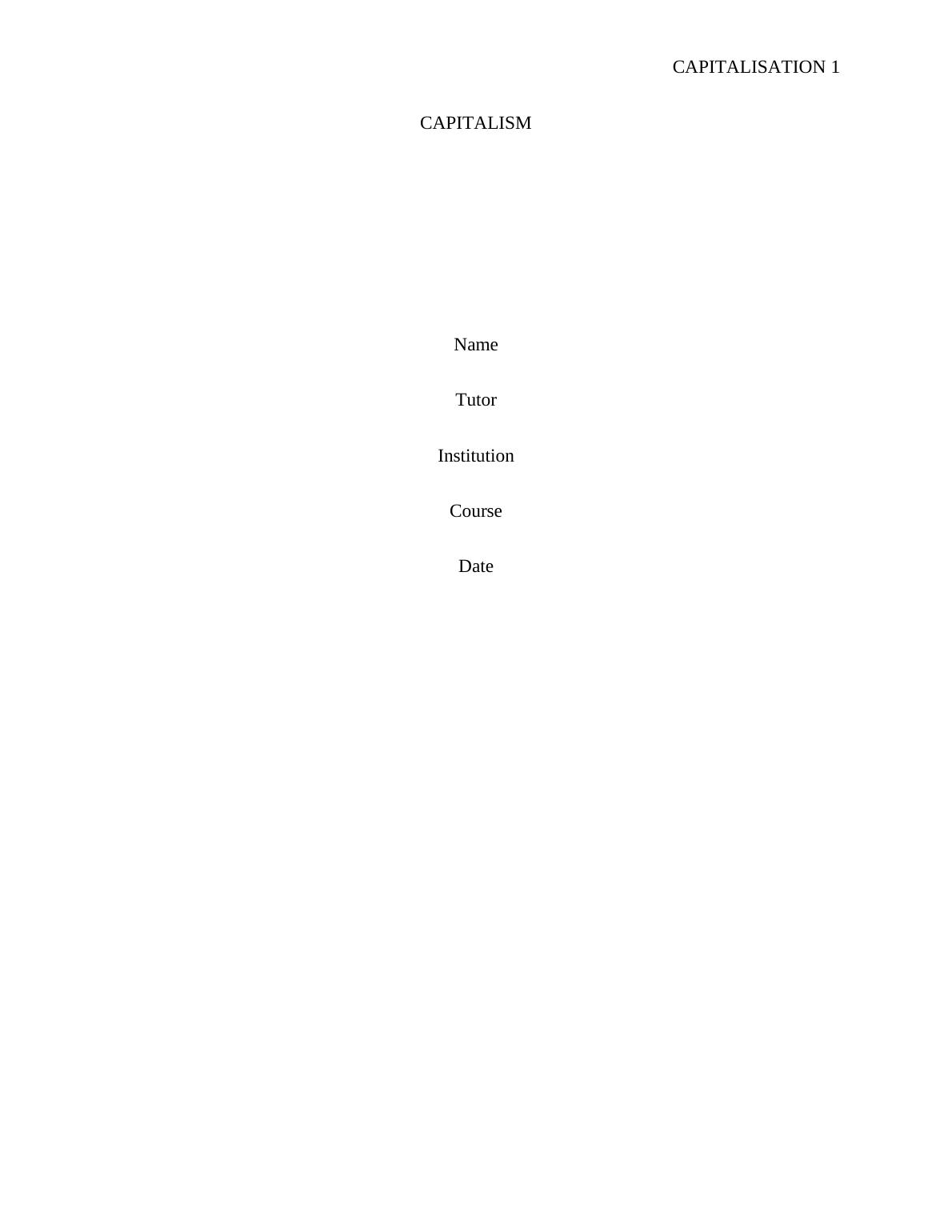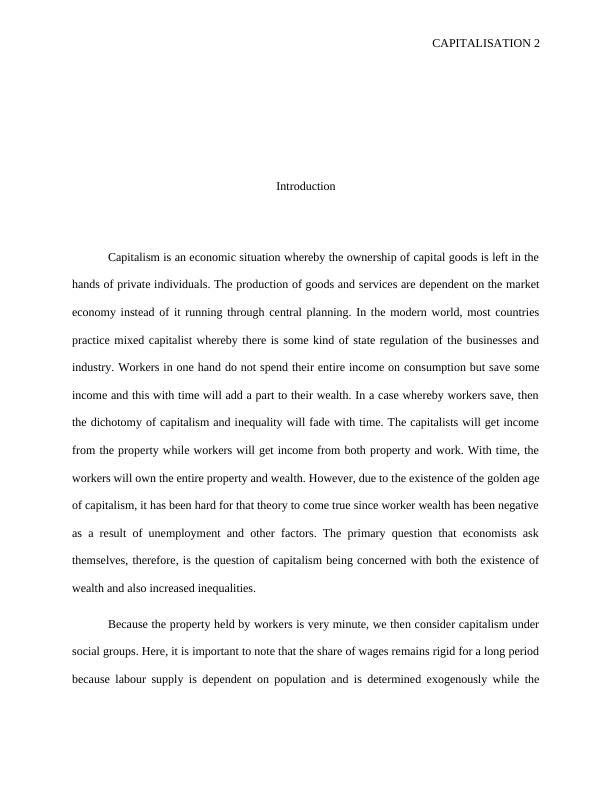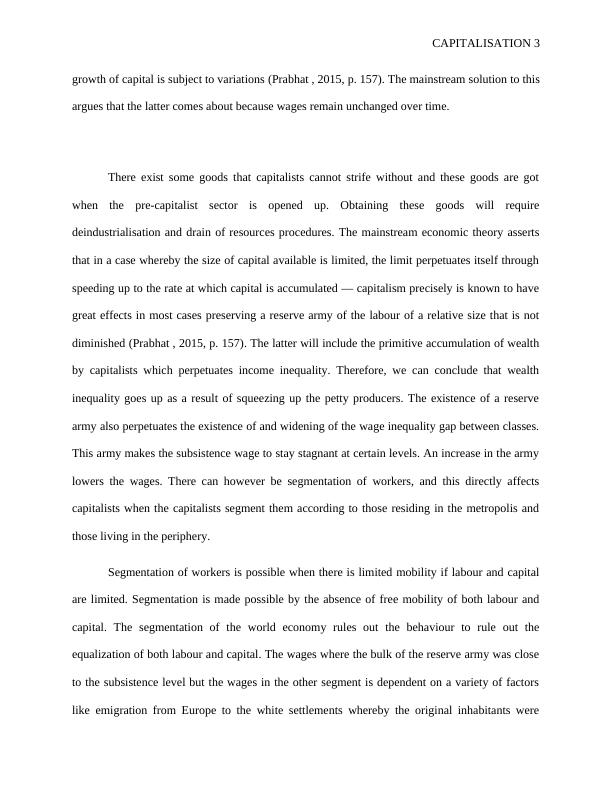Capitalisation implications on income inequality
Added on 2023-05-27
7 Pages1765 Words228 Views
CAPITALISATION 1
CAPITALISM
Name
Tutor
Institution
Course
Date
CAPITALISM
Name
Tutor
Institution
Course
Date

CAPITALISATION 2
Introduction
Capitalism is an economic situation whereby the ownership of capital goods is left in the
hands of private individuals. The production of goods and services are dependent on the market
economy instead of it running through central planning. In the modern world, most countries
practice mixed capitalist whereby there is some kind of state regulation of the businesses and
industry. Workers in one hand do not spend their entire income on consumption but save some
income and this with time will add a part to their wealth. In a case whereby workers save, then
the dichotomy of capitalism and inequality will fade with time. The capitalists will get income
from the property while workers will get income from both property and work. With time, the
workers will own the entire property and wealth. However, due to the existence of the golden age
of capitalism, it has been hard for that theory to come true since worker wealth has been negative
as a result of unemployment and other factors. The primary question that economists ask
themselves, therefore, is the question of capitalism being concerned with both the existence of
wealth and also increased inequalities.
Because the property held by workers is very minute, we then consider capitalism under
social groups. Here, it is important to note that the share of wages remains rigid for a long period
because labour supply is dependent on population and is determined exogenously while the
Introduction
Capitalism is an economic situation whereby the ownership of capital goods is left in the
hands of private individuals. The production of goods and services are dependent on the market
economy instead of it running through central planning. In the modern world, most countries
practice mixed capitalist whereby there is some kind of state regulation of the businesses and
industry. Workers in one hand do not spend their entire income on consumption but save some
income and this with time will add a part to their wealth. In a case whereby workers save, then
the dichotomy of capitalism and inequality will fade with time. The capitalists will get income
from the property while workers will get income from both property and work. With time, the
workers will own the entire property and wealth. However, due to the existence of the golden age
of capitalism, it has been hard for that theory to come true since worker wealth has been negative
as a result of unemployment and other factors. The primary question that economists ask
themselves, therefore, is the question of capitalism being concerned with both the existence of
wealth and also increased inequalities.
Because the property held by workers is very minute, we then consider capitalism under
social groups. Here, it is important to note that the share of wages remains rigid for a long period
because labour supply is dependent on population and is determined exogenously while the

CAPITALISATION 3
growth of capital is subject to variations (Prabhat , 2015, p. 157). The mainstream solution to this
argues that the latter comes about because wages remain unchanged over time.
There exist some goods that capitalists cannot strife without and these goods are got
when the pre-capitalist sector is opened up. Obtaining these goods will require
deindustrialisation and drain of resources procedures. The mainstream economic theory asserts
that in a case whereby the size of capital available is limited, the limit perpetuates itself through
speeding up to the rate at which capital is accumulated — capitalism precisely is known to have
great effects in most cases preserving a reserve army of the labour of a relative size that is not
diminished (Prabhat , 2015, p. 157). The latter will include the primitive accumulation of wealth
by capitalists which perpetuates income inequality. Therefore, we can conclude that wealth
inequality goes up as a result of squeezing up the petty producers. The existence of a reserve
army also perpetuates the existence of and widening of the wage inequality gap between classes.
This army makes the subsistence wage to stay stagnant at certain levels. An increase in the army
lowers the wages. There can however be segmentation of workers, and this directly affects
capitalists when the capitalists segment them according to those residing in the metropolis and
those living in the periphery.
Segmentation of workers is possible when there is limited mobility if labour and capital
are limited. Segmentation is made possible by the absence of free mobility of both labour and
capital. The segmentation of the world economy rules out the behaviour to rule out the
equalization of both labour and capital. The wages where the bulk of the reserve army was close
to the subsistence level but the wages in the other segment is dependent on a variety of factors
like emigration from Europe to the white settlements whereby the original inhabitants were
growth of capital is subject to variations (Prabhat , 2015, p. 157). The mainstream solution to this
argues that the latter comes about because wages remain unchanged over time.
There exist some goods that capitalists cannot strife without and these goods are got
when the pre-capitalist sector is opened up. Obtaining these goods will require
deindustrialisation and drain of resources procedures. The mainstream economic theory asserts
that in a case whereby the size of capital available is limited, the limit perpetuates itself through
speeding up to the rate at which capital is accumulated — capitalism precisely is known to have
great effects in most cases preserving a reserve army of the labour of a relative size that is not
diminished (Prabhat , 2015, p. 157). The latter will include the primitive accumulation of wealth
by capitalists which perpetuates income inequality. Therefore, we can conclude that wealth
inequality goes up as a result of squeezing up the petty producers. The existence of a reserve
army also perpetuates the existence of and widening of the wage inequality gap between classes.
This army makes the subsistence wage to stay stagnant at certain levels. An increase in the army
lowers the wages. There can however be segmentation of workers, and this directly affects
capitalists when the capitalists segment them according to those residing in the metropolis and
those living in the periphery.
Segmentation of workers is possible when there is limited mobility if labour and capital
are limited. Segmentation is made possible by the absence of free mobility of both labour and
capital. The segmentation of the world economy rules out the behaviour to rule out the
equalization of both labour and capital. The wages where the bulk of the reserve army was close
to the subsistence level but the wages in the other segment is dependent on a variety of factors
like emigration from Europe to the white settlements whereby the original inhabitants were

End of preview
Want to access all the pages? Upload your documents or become a member.
